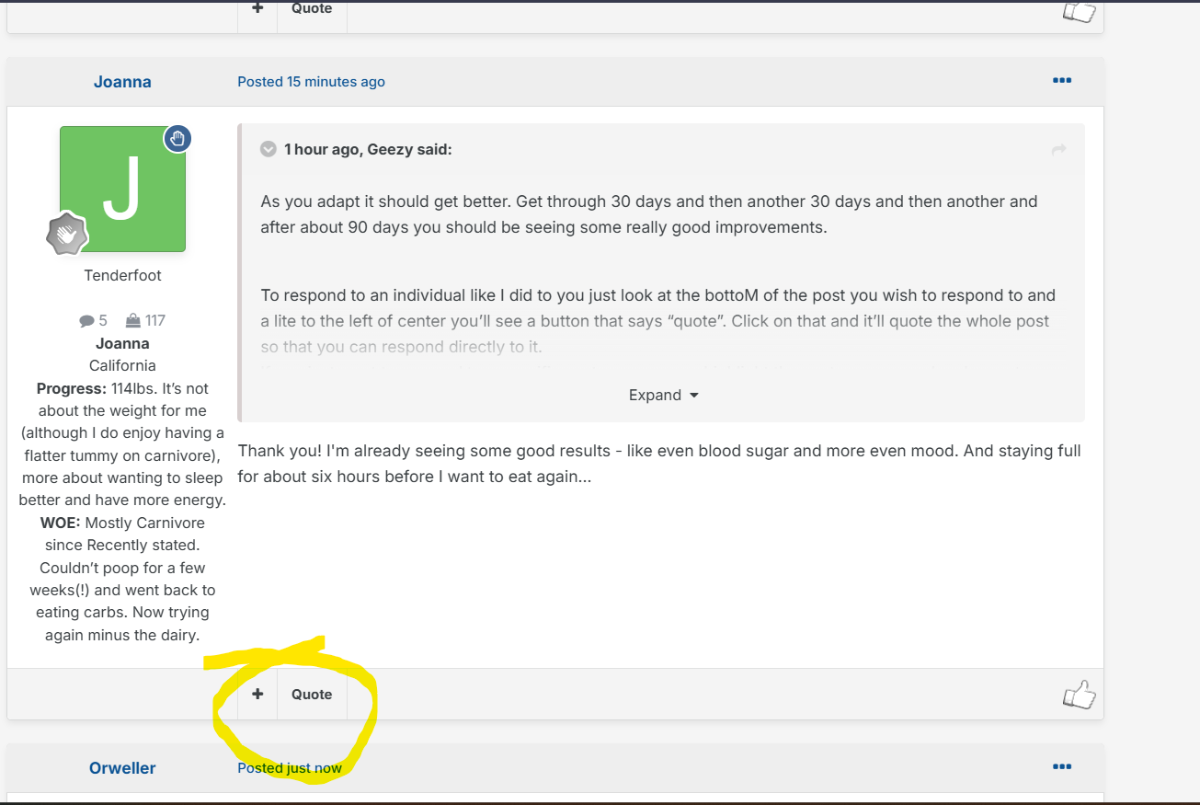Welcome to our Carnivore / Ketovore / Keto Online Community!
Welcome to Carnivore Talk! An online community of people who have discovered the benefits of an carnviore-centric ketogenic diet with the goal of losing weight, optimizing their health, and supporting and encouraging one another. We warmly welcome you! [Read More]
- Replies 13
- Views 2.3k
- Created
- Last Reply
Top Posters In This Topic
-
Bob 5 posts
-
Asmaa 3 posts
-
cwise 2 posts
-
Ravenfreak 1 post
Most Popular Posts
-
I never had a weight problem until I got older. I started Keto in 2018. My husband watched me from the sidelines and then joined me right before we went to Copenhagen for the International Convention.
-
You did it before. You can do it again! Admittedly, whenever I have fallen off this lifestyle and WOE it has been a struggle to get back on. It takes me weeks to get into that diet mindset again,
-
Thank you for sharing your story Bob! I recall seeing those books at stores when I was a kid in the late 90's, I believe my aunt had one of those books too. I've heard great things about the Carnivore










comment_10I became a big boy once I hit drinking age in the mid-late 90's, and it was around that time that my next door neighbor gave me a book to read, called Dr. Atkins New Diet Revolution. I read it from cover to cover in almost no time at all, because it was both easy to understand, and it the science made sense. I applied what I learned and lost weight with ease. If I recall correctly, I went from the low 200's down to just under 165, and for the first time in my life truly felt "skinny". I was a believer in low carb ever since. Unfortunately, I didn't stay on the fourth phase, "Atkins For Life", but instead became a yo-yo dieter in the years and decades since. I have been routinely swinging back and forth between 180 and 230 like a pendulum. Then as I've gotten older, I'd make it down to 190, then 195, then 200, the 205, and started to think my metabolism was slowing down with age.
Now I am in my upper 40's and over the years have developed some chronic conditions that have forced me to give more serious thought to my weight and what I put in my mouth. During the pandemic, I actually lost a lot of weight and could make the connection that it was because I was cooking good food at home because for a time we couldn't go to restaurants and being in crowds was discouraged. My blood labs were improving too. But in 2022 I backslid again and gained it all back, and the blood labs reflected that this was not good. So, I started low carb again in March. But today's "low carb" diets have been tainted by manufacturers who make all these processed "keto" foods, and make up low "net carb" counts using mathematical trickery. I wasn't having much success. Then in late March and ealy April I started learning about True Keto, and decided to go from the "dirty keto" I had been doing to REAL whole food Keto and vowed to never eat sugarcane or grains again. After 6 weeks of just meat and vegetables I was losing weight and feeling fantastic.
In the middle of May I broke my ankle, and knew I was going to be sedentary for the next couple months. Prior to this, I had been learning about Carnivore and intermittent fasting, so on that day I decided to go fully zero carb, carnivore and practice intermittent fasting 16-8. I would eat and noon and again no later than 8pm. During those 2 months where I could not bear any weight on my leg, I lost 10 more pounds.
My blood work is showing improvement too. I've reversed a few conditions, such as high blood pressure and ulcerative colitis, and am working on a couple others. Most of all, I feel fantastic. I'm truly believe I am a committed 97% carnivore, occasional ketovore. I'm trying hard to make sure the only thing that goes in my mouth now comes from the Creator above, from farm to fork, from the field to the table, with very few exceptions. My only regret is that I had learned a lot about this with that book in the 90's but didn't stick with it.
Subscribe to Carnivore Talk on YouTube | Be our guest on the channel | Leave me a voicemail, yo!